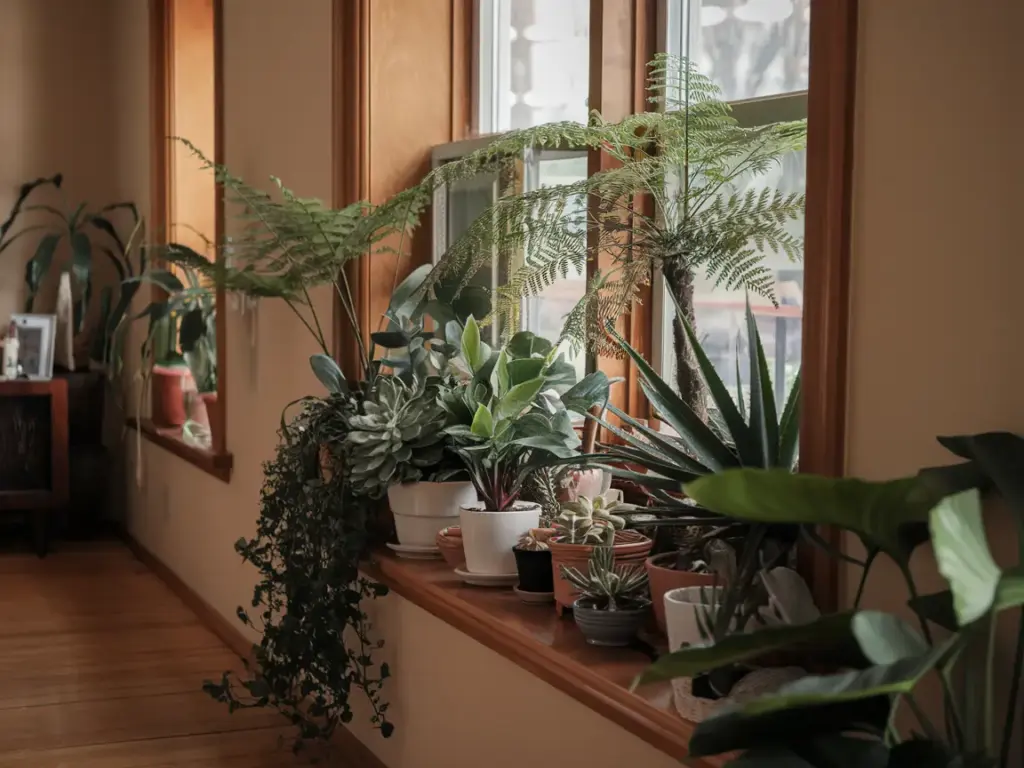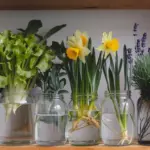2. Group Plants Together for Higher Humidity

You know what’s funny? I discovered this humidity-boosting hack completely by accident! After running out of windowsill space, I started clustering my plants together. Within weeks, I noticed my tropical plants were doing better than ever. That’s when I learned about the amazing power of plant transpiration.
Understanding Plant Transpiration
Think of transpiration as plants sweating (but way more elegant!). When plants release water vapor through their leaves, they create their own miniature ecosystem. One medium-sized plant can transpire up to 100 milliliters of water per day – multiply that by a group of plants, and you’ve got yourself a natural humidifier!
Best Plant Combinations
Through lots of trial and error, I’ve found these groupings work incredibly well:
- Moisture-loving plants together (Calathea, Ferns, Peace Lilies)
- Medium-humidity lovers in their own cluster (Philodendrons, Pothos, Monsteras)
- High transpiration plants as humidity anchors (Peace Lilies are humidity champions!)
I learned that mixing plants with similar needs makes maintenance so much easier. Plus, they create the perfect microclimate for each other!
Optimal Spacing for Humidity Benefits
Here’s the sweet spot I’ve discovered for spacing:
- Keep plants 2-4 inches apart for maximum humidity sharing
- Create clusters of 3-5 plants for best results
- Allow enough space for proper air circulation (about 6 inches between groups)
One mistake I made early on was cramming too many plants together. While it looked lush, it actually created some fungal issues. There’s definitely such thing as too close!
Aesthetic Arrangement Tips
Who says functional can’t be beautiful? Here’s how I create attractive groupings:
- Use the thriller, filler, spiller method
- Place taller plants in the back
- Add different leaf textures for visual interest
- Create levels using plant stands
- Incorporate varying shades of green
Best Plants for Grouping
These plants have become my go-to humidity team players:
- Peace Lily (my group’s humidity MVP!)
- Spider Plants (great middle layer plant)
- Pothos (perfect for trailing effects)
- Chinese Evergreen (excellent humidity producer)
- Prayer Plants (beautiful middle layer option)
Monitoring Your Plant Groups
I keep a digital hygrometer in each plant group to track humidity levels. The sweet spot seems to be about 60-75% humidity for most tropical plants. I’ve noticed that larger leaves generally mean more transpiration, so I always include at least one big-leafed plant in each group.
Ready to take your plant humidity game to the next level? Click the next button to learn about my favorite tool for consistent moisture – humidifiers! I’ll share which features actually matter (and which are just fancy bells and whistles), plus my top recommendations that won’t break the bank. After trying countless models, I’ve finally found the perfect setup that keeps both my plants and my wallet happy!









GIPHY App Key not set. Please check settings